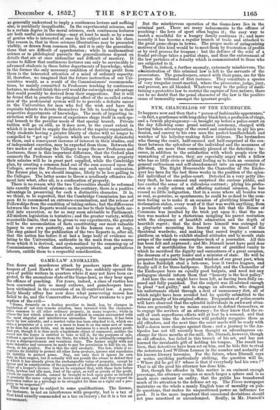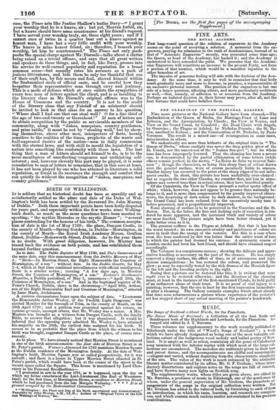NYM, CHANCELLOR OF THE EXCHEQUER
IT happens now and then that a "person of fashionable appearance," —in fact, a gentleman with long shiny black hair, a profusion of rings, and a Jewish physiognomy—is brought up before a police-court on the day following some grand national ceremony, charged with having taken advantage of the crowd and confusion to ply his pro- fession, and convey to his own uses the pocket-handkerchiefs and watches of his holyday-malring fellow citizens. The bystanders who throng the court, half-amused and half-surprised at the con- trast between the splendour of the individual and the meanness of the theft, are more than commonly pleased at the detection; be- cause, in addition to the satisfaction with which people view the unmasking of pretence, they: are especially angry with a fellow who has so little civic or national feeling as to turn an occasion of general enthusiasm and self-abandonment into an opportunity for pilfering. The Right Honourable the Chancellor 'Of the Exche- quer has been for the last three weeks in the position of the splen- did individual of the police-court. Detected in a very petty lite- rary theft, he has amused and surprised the curious public, and has excited the sense of a ridiculous contrast; plying his profes- sion on a really solemn and affecting national occasion, he has roused no little indignation, that in a scene where all besides was so real, so genuine, so spontaneous, he could. be so dead to the com- mon feeling as to make it an occasion of glorifying himself by a declamation stolen, every word of it that was worth anything, from a peculiarly unfit source. It has been felt that the House of Commons was insulted by the trick put upon it; that the na- tion was mocked by a rhetorician mingling his parrot recitation with the eloquence of heartfelt admiration and the depth of heartfelt regret; that the dead hero himself was outraged by a play-actor mounting his funeral ear in the tinsel of the theatrical wardrobe, and making that sacred trophy: a common platform on which to exhibit studied attitudes and to mouth stale scraps of the used-up commonplace-book of a journalist. All this has been felt and expressed; and Mr. Disraeli must have paid dear in hours of mortification for the moment of gratified vanity to which he sacrificed the dignity and earnestness of a great occasion the decorum of a party leader and a minister of state. He will-be prepared to appreciate the profound wisdom of our great poet, when he makes Bardolph steal a lute-case, bear it twelve leagues, and finally sell it for three-halfpence. Bardolph and the Chancellor of the Exchequer have an equally good bargain, and need not any pedagogue should inform them that "honesty is the best policy.'
And here the case might have been left, as having been fully ex- posed and fully punished. But the culprit was ill-advised enough to plead "not guilty," and to engage an advocate, who dragged his unfortunate client through a deal of unnecessary dirt, all of which might have been avoided had he quietly submitted to the natural penalty of his original offence. Frequenters of police-courts will have observed that the splendid individuals in awkward situa- tions are generally by no means anxious to defend themselves, or to engage the services of an attorney; for they know that the re- snit of such superfluous efforts will at best be a remand, and that in the mean time the detectives will probably recognize them as old offenders, and the next time the court meets will be ready with half-a-dozen more charges against them ; and a journey to the An- tipodes has not till recently been thought an advantageous ex- change for three months at the mill. Mr. Disraeli, however, though an old offender, has failed in this branch of his art, and has not learned the invaluable gift of holding his tongue. The result has been, that detectives have been set on him, and he bids fair to rival the notorious Lord William Lennox in the number and audacity of his known literary larcenies. For the future, when Disraeli says or writes anything particularly striking, the question will be, "Where did he get it? whose is that if everybody had his own ? " That is all the good his attorney has done him.
But, though the offender in this matter is an eminent enoenoughpersonage, the attorney occupies so much larger a sphere and is so
much more eminent an entity, that the publics has transferred much of its attention to the defence set up. The Times newspaper maintains on the whole a manly English tone of morality on pub- lic questions, that makes its unquestioned power an influence for good. It is the more important that occasional deviations should not pass unnoticed or uncondenined. Really, in Mr. Disraeli's
ease,-the Times acts like Iustice ShalloW's butler Davy—" I grant your worahip that he is a knave, sir ; but yet, Heaven forbid, sir, but s'knave should have some countenance at his friend's request. I'have served your worship truly, sir, these eight years ; and if 'I cannot once or twice in a quarter bear out a knave against an honed Inan, I have but a very little credit with your worship. The knave is _mine honest friend, sir ; therefore, I beseeehyour worship, let him be countenanced." The Times not only ;pooh- poohs-the special charge against ItIr.Disraeli—talks about a Clatter being raised on a trivial offence, and says that all great writers and speakers do these things, and, in fact, like *Dav-y,, presses into his service its well-earned popularity and reputation for a broad common sense—but soundly rates his accusers as a pack of jealous litterateurs, and bids them be only too thankful that one of -their craft has, by fair means and foul, Shoved himself within the -Brahminical circle of official caste, and Ibe careful how -they bespatter their representative man throngh envy and jealousy. This is a mode of defence which at once enlists the sympathies of every-true man of letters against the client, and is as insulting to the literary class as Mr. Disraeli's original offence was to the House of Commons and the country. It is not to the credit of the literary class that any Falstaff of an aristocrat should be invited to look in that class for an answer to his question, "Where shall I find one that can steal well? 0 for a fine thief of the age of two-and-twenty or thereabout !" If men of letters are to. obtainrecognition by the public as serviceable members of the community, along with "dukes, marquises, country gentlemen, and prize cattle," it must be not by "stealing well," but by show- ing themselves, above other men, interpreters of facts, keenly sensitive to the realities of the times, prophetic of the wants and half-expressed desires of the nation—men in daily communion with the eternal laws, and with skill to mould the legislation of a nation into something like conformity with those laws. The last thing that amen of letters .should set himself to do, is to be the mere -mouthpiece of unreflecting vengeance and unthinking self- interest ; and, however cleverly this part may be played, it is some consolation to men of letters to retnember,that in this case at least, it has not been,played by one who has attained in literature a solid reputation, or found in its resources the strength and comfort that can quietly do without the recognition of "dukes, marquises, and country gentlemen."



































 Previous page
Previous page